From Love, Bonito to Our Second Nature: Singapore entrepreneur Velda Tan's fashion journey
She was a co-founder of Love, Bonito, but stepped away in pursuit of slower fashion with Our Second Nature and Atlas Kind, where clothing is “not just a product, but also an emotional connection with customers.”
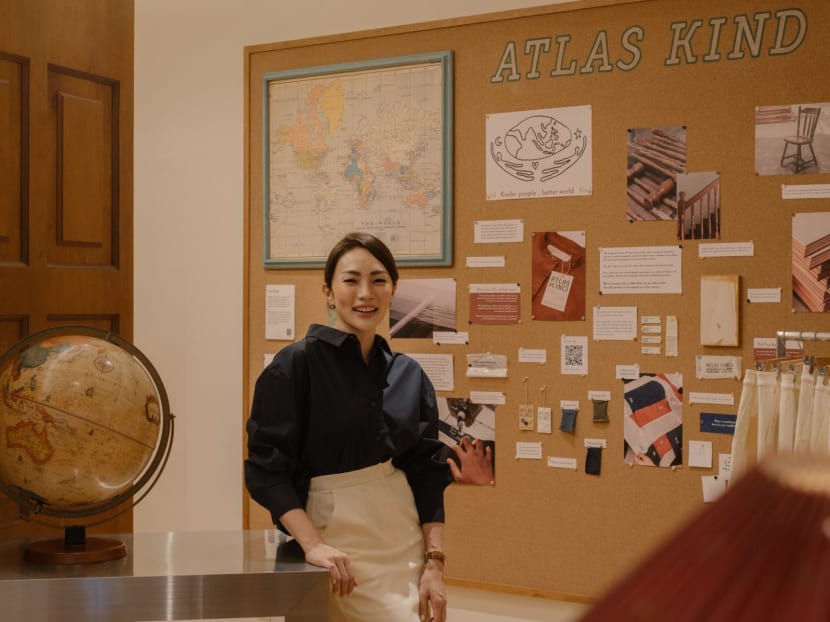
Our Second Nature founder, Velda Tan. (Photo: Velda Tan)

This audio is generated by an AI tool.
Velda Tan is one of those people who makes you feel like you’re speaking too quickly. We’re in a cafe chatting about her two decades in the Singapore fashion scene, and while my questions are coming fast and furious, the 36-year-old’s answers are measured, and her tone gentle and thoughtful.
When she says that after eight years of running a fast fashion business, she felt like she was burned out and needed a break, you believe her. Not because you think she couldn’t keep up with fast fashion’s frenetic pace, but because you get an inkling that someone like her might thrive better in a slower and more mindful setting.
“I realised what my strengths and weaknesses are quite early on,” said Tan. “And it felt like the fast fashion model isn’t what I'm aligned with. I know my weaknesses are in things like operations and fulfilment, and that innately, I’m a creative person.”
HOW LOVE, BONITO CAME ABOUT
Those familiar with the history of the Singapore fashion scene for the millennial generation and after will know that Velda Tan, along with her sister Viola Tan and friend Rachel Lim, started a blog selling their pre-loved clothes for extra pocket money in 2005, and how that grew into BonitoChico, a pioneer of local online retail.
I felt that I threw myself into this industry, quite accidentally.
“When we first started in 2005, it was so manual,” laughed Tan. “There were no automated systems at all – we had to go to the ATM to transfer money or check on payment, and stick stamps on packages and go to the post office to mail them. It was also quite taboo to shop online. I remember when I wanted to buy something from the US, and my mum was like, ‘Are you sure it's safe? Is the parcel going to come?’”
With BonitoChico, the trio started making overseas trips, such as to Bangkok wholesale markets, to buy clothes to sell on their website. The need to automate became clear when they were sending out thousands of orders manually, emailing each customer and checking their bank accounts for individual payments.
In 2010, Love, Bonito was born, from the entrepreneurial threesome’s desire to create their own affordable and accessible fashion label for the Asian market. An automated system that tracked orders, payment, warehousing and shipping allowed dresses, shirts and pants to move at breakneck speed, and saw the brand scaling new heights.
AT A CROSSROAD
Unfortunately, by 2013, Tan suffered a burnout, and the distinct desire to try something else. “After eight years, I was at a crossroads,” she said. “The business grew to a size which I felt was too big and too fast for me. Innately, this wasn’t what I was meant to do as a creative. I promised my parents when I left school in my second year of university to focus on the business that if I don’t succeed, I will go back to school.”
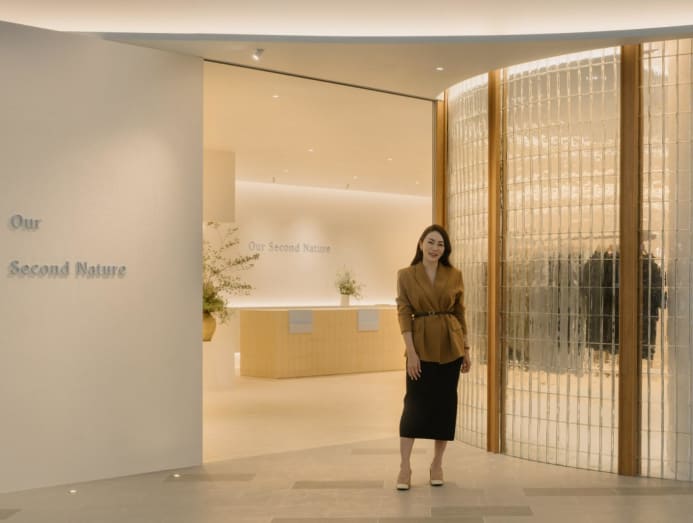
She packed her bags for London, dabbled in F&B and floristry, and finally came full circle by enrolling in fashion courses in Central Saint Martins. “I did fashion marketing, merchandising, pattern-making – things and technicalities in fashion that I wanted to understand. Because I felt that I threw myself into this industry, quite accidentally,” said Tan.
Two years later, in 2015, she was ready to throw herself back into the industry, not so accidentally this time. She launched Collate The Label, which focused on occasion wear with more premium prices, with a show at Singapore Fashion Week.
“One of the challenges I had with Collate was getting people to recognise it as a local designer label, said Tan. “Because of our positioning and price point [over S$200 for a dress], it wasn't so suitable for the market at that point.”
STARTING OUR SECOND NATURE
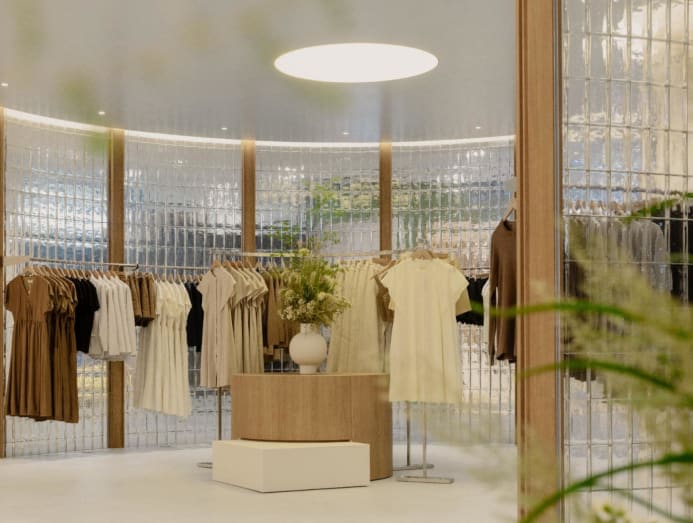
Collate ran for about two years, and Tan quickly pivoted to her next label, Our Second Nature (OSN), launched at the end of 2016. Taking with her all the learnings from operating a fast fashion business and then a mid-range label, she seems to have hit a sweet spot on the spectrum of discount to designer with this brand focused on classics with a soft modern twist.
Our Second Nature now boasts two stores – a 1,100 sq ft boutique in Chip Bee Gardens and a newly-renovated 4,000 sq ft store in Great World City, which carries womenswear, menswear, kidswear and home and lifestyle goods.
“The experiment with Collate eventually birthed OSN, and it was really about being on the ground, and engaging with customers through social media, learning and retrying, and relearning,” said Tan, who is the creative director of the label and heads the design team. “I wanted to create something which isn’t fast fashion but is still accessible.”
Our prints became a signature and with every print collection, we want to tell a story, and take people on a journey.
"With OSN, the key was really the connection with our customers. Everything that we put out there is to try to create that bond between consumer and brand. Our prints became a signature and with every print collection, we want to tell a story, and take people on a journey. We want our clothing to be not just a product, but also an emotional connection with customers, to enrich and elevate everyday lives.”
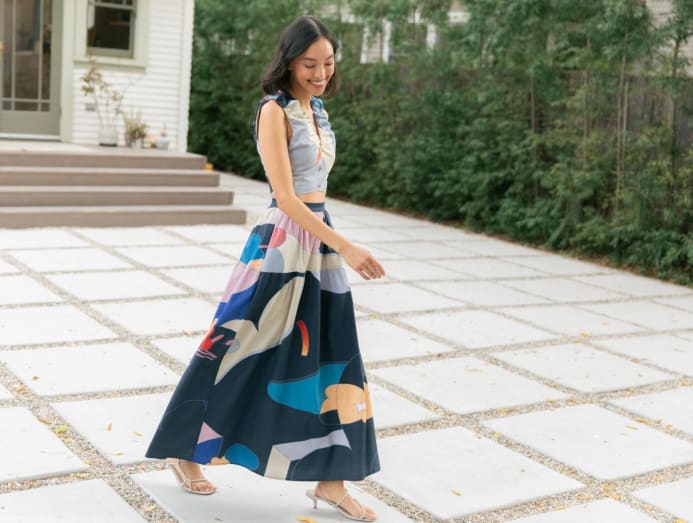
Part of Our Second Nature’s winning formula requires that collections drop far less frequently than fast fashion brands, and their popular dresses, tops and skirts with abstract and arty prints are often sold out, with customers put on waitlists. This is deliberate.
“We have four to five prints and about eight major collections a year,” explained Tan. “So new products drop every one-and-a-half months. With fast fashion, you’d get drops every week, or even every day. For us, it’s really about being authentic and exercising some sort of restraint, to not put out too many designs and products that won’t add value to our customers’ lives, and not to stock too many of the same item, to avoid wastage and leftover inventory.”
FORAY INTO SUSTAINABILITY
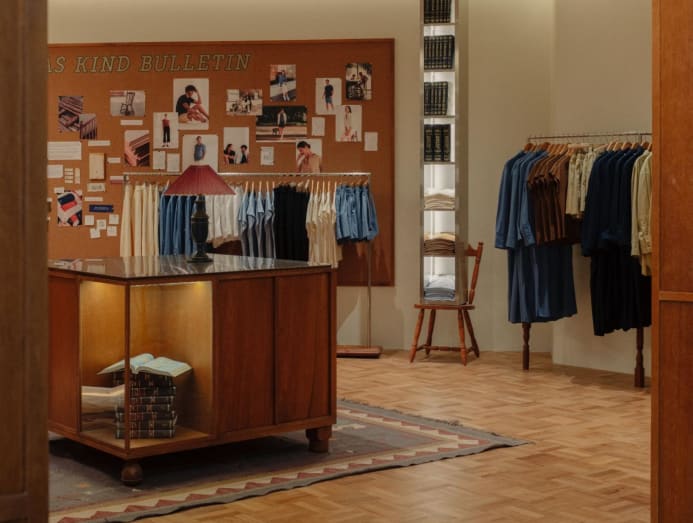
Which brings us to Atlas Kind, Tan’s foray into more sustainable ways of consuming fashion. “It started off being a small step within OSN to educate ourselves, but the sustainable collection took off,” said Tan.
“It was surprising to us that we had a group of customers who wanted to be even more thoughtful in their purchases. We took it as a sign to try something totally new, for a chance to have more focused messaging about sustainability with a new brand.”
The new label occupies a sizeable shop space with its own unique aesthetic beside OSN at Great World City, with price points that are slightly higher, at S$109 for a top, compared to S$60 to S$79 at OSN.
The elevated prices are because the garments have a longer production cycle, due to the more tedious process of finding sustainable materials such as deadstock fabrics and organic dyes, making sure that details such as zips, buttons and packaging are from sustainable sources, and that the factories they work with have fair wages and good trade practices.
Tan’s gentle and non-aggressive approach to business extends to her personal life. With her entrepreneur husband Frederick Yap, 36, they are “super chill” parents to two girls, six-year-old Ellery and 16-month-old Eleyna.
SEASONS IN LIFE
“I feel like in different seasons of life, you have different priorities,” shared Tan. “And with my two children being still very young, I want to spend more quality time with them. I guess I could do even more with the business, like launch more brands or be more ambitious, or open more stores and expand to different markets, but I think the conscious choice is really to find balance and time for family.”
When asked why she is so open about her fertility and pregnancy challenges on Instagram (she’s shared deeply personal stories about IVF and a miscarriage), Tan said: “Social media is where everybody highlights the positive things in their lives. I think it can get quite toxic, seeing people doing things that you're not, and feeling that you've not accomplished anything. I wanted to show that you can be vulnerable on social media. What I went through [with my fertility issues] was really isolating, but through my peers, I felt less alone.”
“There are many women going through the same thing, and sharing helps. I also host regular online and offline support groups – we have a platform called Fertility Support SG, where we share information about assisted reproductive technology in Singapore, where you can get grants and subsidies, etc. My goal is for everybody to walk away feeling less alone.”
I might want to bring Collate back.
As for her plans for the future, Tan emphasised that she has no desire to open too many stores (“I think for Singapore, at most three”) or expand too quickly overseas (“It’s always been just pop-ups, and with foreign sales coming up to about 15 per cent, and the US market being our biggest market after Singapore, I do think that it's time for us to reach out to communities elsewhere”).
Strangely, she has a dream to go backwards, in a way. “I might want to bring Collate back,” she said. “Maybe the market is ready now and it’s the right time and place. Fashion comes in cycles and brands also have their life cycles. Collate is more about occasion wear, for events and weddings, and there might be a gap in the market for a Singapore brand. Ong Shunmugam does very well in that category but I think there is still space. Collate The Label is something that is of sentimental value to me.”










